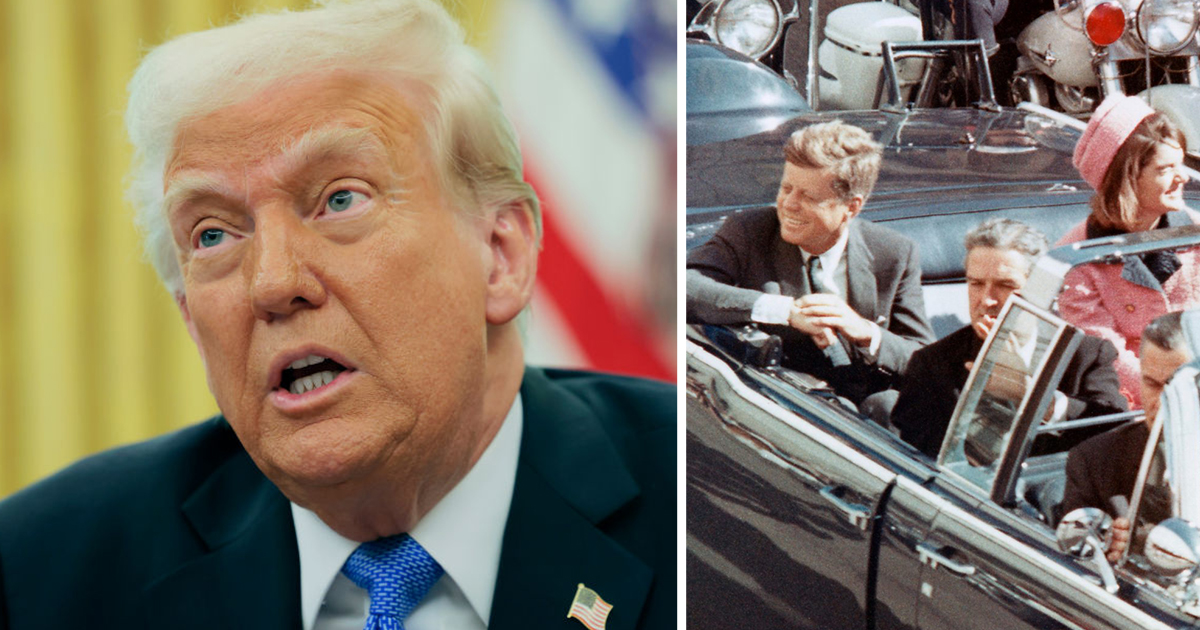Donald Trump Shares His Belief on Who Was Responsible for JFK’s Assassination
The assassination of President John F. Kennedy in Dallas in 1963 continues to be one of the most tragic and mysterious events in American history, casting a long shadow over the nation for more than six decades.
While many believe that Lee Harvey Oswald was the lone gunman responsible for JFK’s death, some continue to question the official account. Former President Donald Trump recently weighed in on this enduring debate, affirming his stance that Oswald was indeed the assassin, but also suggesting the possibility that he may have had help.
Kennedy’s assassination, marking its 62nd anniversary this year, has remained at the center of public intrigue, in part because of the countless conspiracy theories that surround it. These theories propose various alternative scenarios, each with its own set of suspects and motivations. Last week, the case was once again thrust into the national conversation when Trump authorized the release of over 2,000 pages of previously classified documents related to the assassination. This disclosure added to the over 80,000 pages he had previously indicated would be made public.
The newly declassified files included a combination of official reports and handwritten notes that had accumulated over decades. Some of these revelations were startling, such as testimony from a senior CIA officer suggesting that the so-called “deep state” might have been involved in the plot to kill Kennedy.
One document, for instance, highlighted Oswald’s poor marksmanship during firearms training in the Soviet Union. Another mentioned that he had a tumultuous relationship with his wife, Marina, and was under surveillance by the KGB, which added further layers to the mystery of his motivations and connections. The papers also revealed that the Secret Service had received warnings as early as August about the possibility of an attack on Kennedy’s life.
Despite the fresh details emerging from the documents, there remains no consensus on the question of whether Oswald acted alone. The Warren Commission, which investigated the assassination, concluded that Oswald was the sole assassin. However, this conclusion has done little to quell widespread skepticism, and over the years, numerous conspiracy theories have taken root. These theories range from claims of government cover-ups to suggestions that powerful organizations like the CIA, the Mafia, or foreign governments, including the Soviet Union and Cuba, were involved in orchestrating the assassination.
In a recent interview aboard Air Force One with Clay Travis, the founder of OutKick, Donald Trump shared his thoughts on the assassination and the conspiracy theories surrounding it. Trump made it clear that he still believes Lee Harvey Oswald was the individual who killed President Kennedy.
When asked by Travis if he believed Oswald was responsible for JFK’s death, Trump responded affirmatively, saying, “I do. And I’ve always felt that, but of course, was he helped?”
This comment touches on the long-standing conspiracy theory that Oswald may have been part of a larger plot, possibly involving other groups or individuals with a vested interest in Kennedy’s death. While Oswald was arrested and charged with the assassination, just two days later, he was shot and killed by nightclub owner Jack Ruby, which only fueled the suspicion that there was more to the story.
For some, the idea that Oswald acted alone doesn’t fully account for the circumstances of the assassination. The theories suggesting a broader conspiracy point to Oswald’s limited experience as a marksman and the possibility that he was either manipulated into carrying out the assassination or used as a scapegoat. The involvement of other parties, such as the CIA, the Mafia, or even elements within the U.S. government, has been suggested as a way to explain the events surrounding Kennedy’s death.
Trump’s comments about the release of the newly declassified documents revealed that he was not particularly impressed with the content, stating that he didn’t think there was anything “earth-shattering” in the material. Instead, he left it up to the public and historians to make their own judgments about the implications of the documents.
While Trump’s position on the assassination may not have changed, the release of these documents has contributed to a renewed public interest in the case, reminding us that questions surrounding JFK’s death have never fully been answered. With the continued interest in these documents and the public’s ongoing fascination with conspiracy theories, the assassination remains a poignant chapter in U.S. history, one that will likely continue to provoke debate and speculation for years to come.
